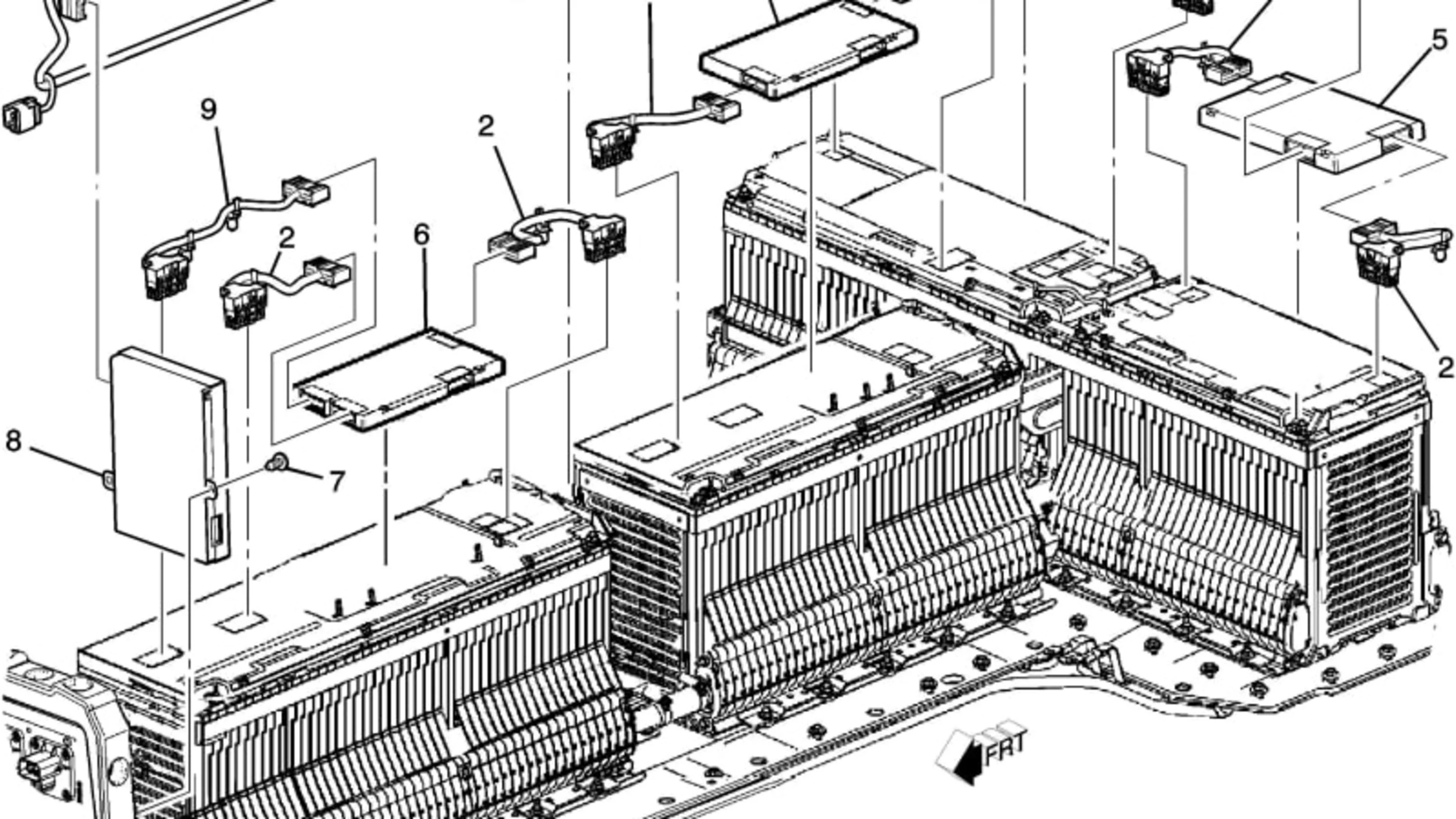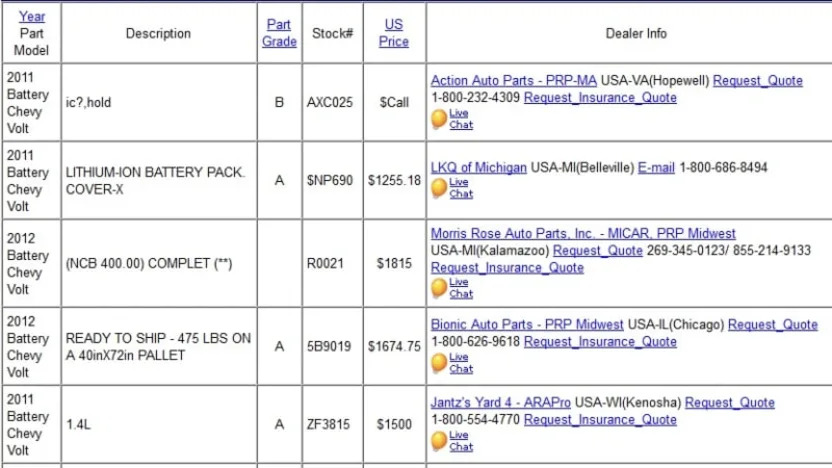The release of the new, 2016 Chevy Volt is sure to bring a surge of used electric vehicles to the market as early adopters trade their older models in. Many of these cars are selling for a fraction of their original price, thanks in part to federal and state incentives that lowered the initial cost to the first owner, which opens these cars up to a whole new class of consumers. While the prices are getting attractive, potential buyers are still hesitant to buy a used EV due to uncertainty about service and repair costs, but there may be some good news on the horizon.
The Chevy Volt comes with a battery warranty that is good for at least 8 years and 100,000 miles, but many of the Volts popping up on the market have passed that 100,000-mile mark. The threat of needing a new battery can be a deterrent, especially with some dealers quoting prices as high as $34,000 for a full "drive motor battery replacement." That sum is more than the MSRP of a 2016 model.
Some of the fear of EV maintenance and repair comes from the mystery of the individual pieces that make up the drivetrain and charging system. If we take a look at the Volt in terms of analogs to a traditional internal-combustion vehicle, the outlook becomes a little more friendly. The Volt battery pack consists of three lithium-ion modules in a T-shaped arrangement, each of which can be serviced individually. Module 1 is made up of 90 cells and corresponds to GM part number 22954462, which retails for $3,258.33; module 2 is made up of 72 cells and corresponds to GM part number 22954463, which retails for $2,930.00; lastly, module 3 is made up of 125 cells and corresponds to GM part number 22954464, and retails for $4,933.33. These part numbers have been added to the dealer order systems but have not shown up in the distribution centers at this time. Although all three of the modules add up to a fairly large $11,121.66 total and are still on hold for dealer ordering, the good news is that in most cases these battery cell modules do not need to be replaced.

There are many other individual pieces mounted on the battery pack that are serviceable, such as the Battery Energy Control Modules (BECM) and the Battery Interface Control Modules (BICM). These modules control and monitor the battery packs and charging system and have been known to fail while the lithium-ion battery cells are not at fault. Some have been replaced under warranty, but if you are stuck buying one they run about $255 a piece for the part. Getting a module replaced will cost you around $2,100 for parts, labor, and programming; labor can be a big hit since dropping the battery pack is required in order to service these modules.
If you are looking to replace the entire pack, the outlook has gotten better based on recent reports of refurbished battery packs becoming available for around $4,000. In these cases your entire battery pack is exchanged for one that comes from a refurbishing facility. These facilities do not produce any new parts but instead take packs that come in on exchange and combine the harvested pieces that are within spec from multiple packs to assemble refurbished packs.

The last avenue for battery repairs is looking at junkyards and automotive recyclers for battery packs pulled from salvaged vehicles. I did a search at car-part.com and found that a complete battery pack with all the modules runs from $1,450 to $2,100 from junkyards in my area while just the battery cells run about $1,255 to $1,700. Used BECM and BICM modules show a range of prices from $50 to $125. If you are inclined to work on the car yourself (this means you understand the additional risks of working on a vehicle with high-voltage equipment) you can get by with replacing many of the individual parts without spending a fortune. If you prefer to work with an independent mechanic, labor rates from a qualified shop for dropping a pack and installing a replacement are about $1,000. The future of a 200,000-mile Volt does not seem so bleak when you consider that battery prices are coming down quickly while a new generation of mechanics is learning to work on them every day.
The Chevy Volt comes with a battery warranty that is good for at least 8 years and 100,000 miles, but many of the Volts popping up on the market have passed that 100,000-mile mark. The threat of needing a new battery can be a deterrent, especially with some dealers quoting prices as high as $34,000 for a full "drive motor battery replacement." That sum is more than the MSRP of a 2016 model.
Some of the fear of EV maintenance and repair comes from the mystery of the individual pieces that make up the drivetrain and charging system. If we take a look at the Volt in terms of analogs to a traditional internal-combustion vehicle, the outlook becomes a little more friendly. The Volt battery pack consists of three lithium-ion modules in a T-shaped arrangement, each of which can be serviced individually. Module 1 is made up of 90 cells and corresponds to GM part number 22954462, which retails for $3,258.33; module 2 is made up of 72 cells and corresponds to GM part number 22954463, which retails for $2,930.00; lastly, module 3 is made up of 125 cells and corresponds to GM part number 22954464, and retails for $4,933.33. These part numbers have been added to the dealer order systems but have not shown up in the distribution centers at this time. Although all three of the modules add up to a fairly large $11,121.66 total and are still on hold for dealer ordering, the good news is that in most cases these battery cell modules do not need to be replaced.
There are many other individual pieces mounted on the battery pack that are serviceable, such as the Battery Energy Control Modules (BECM) and the Battery Interface Control Modules (BICM). These modules control and monitor the battery packs and charging system and have been known to fail while the lithium-ion battery cells are not at fault. Some have been replaced under warranty, but if you are stuck buying one they run about $255 a piece for the part. Getting a module replaced will cost you around $2,100 for parts, labor, and programming; labor can be a big hit since dropping the battery pack is required in order to service these modules.
If you are looking to replace the entire pack, the outlook has gotten better based on recent reports of refurbished battery packs becoming available for around $4,000. In these cases your entire battery pack is exchanged for one that comes from a refurbishing facility. These facilities do not produce any new parts but instead take packs that come in on exchange and combine the harvested pieces that are within spec from multiple packs to assemble refurbished packs.

The last avenue for battery repairs is looking at junkyards and automotive recyclers for battery packs pulled from salvaged vehicles. I did a search at car-part.com and found that a complete battery pack with all the modules runs from $1,450 to $2,100 from junkyards in my area while just the battery cells run about $1,255 to $1,700. Used BECM and BICM modules show a range of prices from $50 to $125. If you are inclined to work on the car yourself (this means you understand the additional risks of working on a vehicle with high-voltage equipment) you can get by with replacing many of the individual parts without spending a fortune. If you prefer to work with an independent mechanic, labor rates from a qualified shop for dropping a pack and installing a replacement are about $1,000. The future of a 200,000-mile Volt does not seem so bleak when you consider that battery prices are coming down quickly while a new generation of mechanics is learning to work on them every day.


Sign in to post
Please sign in to leave a comment.
Continue